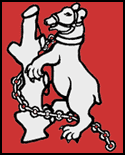I don't know that you can separate subjective self-images from social associations. That, in fact, was what feudalism was all about. Technically, all the land belonged to the King, or the Archduke or the Emperor. He gave rights in property to his vassals, who became his feudatories, promising supplies (literally) and military service for those rights in property. In turn, they gave rights in property to lesser members of the nobility or knights, who in turn provided supplies and military service.
The system never worked exactly as planned and that's an oversimplification of how it worked, but it is a direct and complete statement of how those participating in it saw it. In England in the 15th century, during the civil wars which are now called the Wars of the Roses, these associations were known as "affinities." Perhaps the most powerful man in England for a time was Richard Neville, the Earl of Warwick, known as the Kingmaker, the leader of the faction of the House of York, and nephew of the Duke of York. If you were a member of his affinity, you wore red and white, his colors, and his badge of the bear and the ragged staff.

This proclaimed to all who could see what faction you adhered to. You at least nominally pledged your life and your treasure to him, and would be expected to support him politically and to give military service on demand. People did just exactly that, and Warwick was expected to repay that loyalty, which is exactly what he did. He proclaimed his power and prestige by his generosity, by the largesse which he distributed to his affinity. On one occasion, he feasted 3000 people at Middleham Castle.
But the Wars of the Roses were hard on the nobility. In the last Parliament before they began, 52 lords secular attended the House of Lords. After Henry Tudor, Henry VII, defeated Richard III (Warwick had been dead about 15 years by then), only 16 lords secular answered the writs for the new Parliament. Henry was able to ram a bill through the weakened Parliament outlawing affinities and liveried companies (bands of armed men who wore the colors and badges of their lord).
That, however, didn't change that human tendency to associate willfully and subjectively. People became members of guilds, they remained Catholics or became Lutherans or Anabaptists. If you prepared wool cloth for the garment industry, you took the name Fuller. If you had made the pilgrimage to Jerusalem, you took the name Palmer. People eagerly sought to advertise their associations.
Today someone might proclaim that they are a White Sox fan, or a supporter of Real Madrid. One might call himself a Social Democrat or a Tory. But that human will to associate and to proclaim one's association remains. Twenty thousand years ago, you might have only been a member of the clan of the Bison. Things are much more complicated today, but they have not changed essentially.